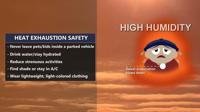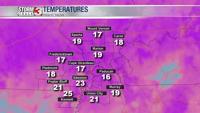CARTERVILLE (WSIL) â€� You’ve probably heard the phrase "It’s not the heat, it’s the humidity." That’s a common saying in the Midwest during the summer months where the temperature is warm, but the humidity makes it feel even warmer to the human body. That’s where "heat index" comes into play.Â
, also known as the apparent temperature, is what the temperature feels like to the human body when relative humidity is combined with the air temperature. The heat index takes into consideration the human body’s comfort level.

Humidity combined with heat can add stress to the body. That’s because when the body gets hot, it begins to sweat or perspire to cool itself off. The body relies on that perspiration to evaporate, a cooling process. When perspiration is evaporated off the body, it effectively reduces the body’s temperature.Â
In high humidity, evaporation is reduced and the body can’t control its temperature.Â
While the human body feels warmer in humid conditions, the opposite is true when the relative humidity decreases as the rate of perspiration increases. Â

It’s worth noting that the heat index is typically measured in shady locations.  If you are exposed to direct sunlight, the heat index value can be increased by up to 15°. Â

� Never leave a child, adult, or animal alone inside a vehicle on a warm day.
� Find places with air conditioning. Libraries, shopping malls, and community centers can provide a cool place to take a break from the heat.
� If you’re outside, find shade. Wear a hat wide enough to protect your face.
� Wear loose, lightweight, light-colored clothing.
� Drink plenty of fluids to stay hydrated. If you or someone you care for is on a special diet, ask a doctor how best to accommodate it.
� Do not use electric fans when the temperature outside is more than 95 degrees, as this could increase the risk of heat-related illness. Fans create air flow and a false sense of comfort, but do not reduce body temperature.
� Avoid high-energy activities.
� Check yourself, family members, and neighbors for signs of heat-related illness.





















